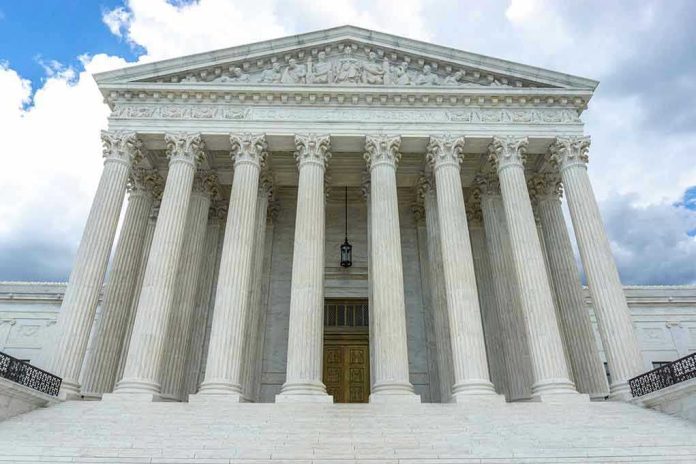
The highest court in the land now faces a question that could redefine the legacy of the president: Should the Supreme Court erase a jury’s verdict that found Donald Trump liable for sexually abusing E. Jean Carroll?
Story Snapshot
- The Supreme Court is evaluating President Trump’s request to overturn a sex abuse verdict.
- The case centers on writer E. Jean Carroll’s allegations of abuse in the mid-1990s.
- The jury previously held Trump liable, sparking national debate and legal battles.
- This Supreme Court review could set a precedent for presidential accountability.
The Supreme Court’s Role in Presidential Legacy
Donald Trump’s legal team has petitioned the Supreme Court, seeking to reverse a New York jury’s decision that found him liable for sexual abuse. This request thrusts the highest court into the spotlight once again, forcing it to confront the boundaries of presidential immunity and personal accountability. The stakes are enormous: a reversal could erase a rare legal rebuke of a president, while upholding the verdict would reinforce the principle that no one is above the law.
Public discourse has already been electrified by the case, which brings together celebrity, politics, and the #MeToo movement. The Supreme Court’s involvement elevates the drama, as justices must weigh not just the facts of the case, but also the broader implications for the presidency and the American justice system. This case asks the nation’s top jurists to decide whether a president can be held civilly liable for alleged misconduct predating his time in office, and whether the judicial system can deliver justice when powerful individuals are involved.
E. Jean Carroll vs. Donald Trump: A Case That Resonates
E. Jean Carroll, a longtime advice columnist, accused Trump of assaulting her in a Manhattan department store in the 1990s. Trump denied the allegations, sparking a public feud that escalated into a high-profile civil trial. The jury, after considering evidence and testimony from both sides, ruled in Carroll’s favor, finding Trump liable for sexual abuse and awarding Carroll significant damages. Trump’s legal team quickly vowed to fight the verdict, arguing that the trial was unfair and the evidence insufficient.
The case has become a flashpoint for debates about the credibility of sexual assault allegations, the responsibilities of public figures, and the ability of ordinary citizens to seek justice against the powerful. For many, the verdict was a vindication for survivors of abuse. For others, it was a politically charged attack on a president. The Supreme Court, by agreeing to hear the case, signals that the legal questions raised go beyond the individuals involved and touch on fundamental issues of American law.
The Political and Legal Stakes
Trump’s appeal to the Supreme Court underscores the unique challenges of holding presidents accountable. The legal team argues that the verdict sets a dangerous precedent, exposing leaders to endless litigation for actions alleged to have occurred before or during their time in office. Opponents counter that accountability is essential, especially when the allegations concern personal misconduct. The Court’s decision, whichever way it falls, will reverberate through American politics for years to come.
Presidential immunity has long been a contentious issue. The Founders envisioned a government where leaders answer to the law, but the realities of modern politics often complicate that vision. If the Supreme Court overturns the verdict, critics will argue that it grants undue protection to the powerful. If the verdict stands, it could embolden future plaintiffs to pursue civil claims against public officials, reshaping the post-presidency landscape.
A Nation Watches the Court
The Supreme Court’s deliberations will not occur in a vacuum. Every move will be scrutinized by legal analysts, political partisans, and ordinary Americans alike. The case offers a rare glimpse into the intersection of law, politics, and personal conduct at the highest levels of government. The outcome could either reaffirm faith in the justice system’s impartiality or deepen cynicism about elite privilege.
The verdict on Trump’s appeal will not just determine the outcome for E. Jean Carroll or Donald Trump; it will help define the contours of accountability, justice, and presidential legacy for a generation. As the Supreme Court weighs its decision, the nation waits—and wonders what precedent will emerge from these historic proceedings.
Sources:
Trump Asks Supreme Court to Overturn Verdict in E. Jean Carroll Case







